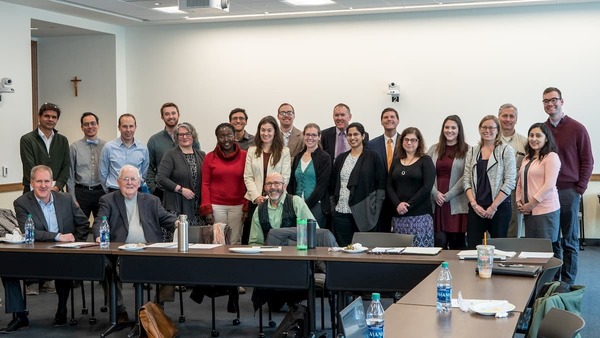
Practitioner-oriented organizations that do global development work are increasingly partnering with academic institutions to achieve greater impact. Non-Governmental Organizations (NGOs) are under more pressure than ever from donors to generate more rigorous evidence about the results of their work, particularly in a climate of more scrutinized funding for global development efforts.
Creating synergy between the metrics of academic institutions and practitioner-based organizations can be challenging; but the University of Notre Dame and Catholic Relief Services (CRS) have managed to cultivate a partnership that has spanned twenty years.
Michael Sweikar, Executive Director of Notre Dame’s Pulte Institute for Global Development, and David Leege, former CRS Director for Monitoring, Evaluation, Accountability and Learning, have written an article which documents the partnership between Notre Dame and CRS as they seek to fight poverty and inequality worldwide.
The article, From Associational Value to Complementary Synergy: Eighteen Years of NGO-University Partnership, was published in Praxis and provides a model for how university-NGO partnerships can continue to grow together over time.
Notre Dame and CRS have been working together on joint programs to address global development challenges for the most vulnerable since 2000. Starting with a collaboration on issues of peacebuilding between Notre Dame’s Kroc Institute for International Peace Studies and CRS, the partnership grew over the years based on common values enshrined in Catholic social teaching. The collaboration expanded as staff at each institution developed a better understanding of each other’s respective objectives, and experienced increasing mutual benefit.
“Our country must have sound policies based on evidence from the realities of on-the-ground implementation, and this can be driven by partnerships between NGOs and academic institutions,” says Sweikar, who is also a concurrent Assistant Professor of the Practice in Notre Dame’s Keough School of Global Affairs. “NGOs and universities are both more successful in effectively helping to fight poverty and inequality when we work together.”
“Working together in several countries throughout the world, our partnership with Notre Dame has enabled CRS to document evidence of success and innovate and improve our programs in areas such as education, trauma and resilience in conflict areas, peacebuilding, and food security,” says Simone Buechler, Senior Advisor for University Engagement and Research at Catholic Relief Services. “Through exchanges, research and evaluations, and leadership training, together we have tested game-changing new approaches that help us achieve our common goal of transforming the lives of poor and vulnerable communities.”
CRS has partnered on programs with several Notre Dame entities – including the Alliance for Catholic Education, the Keough School’s Integration Lab, the Kroc Institute, and the Pulte Institute. Moving forward, the partnership hopes to unearth new collaborative opportunities for analytical research, monitoring and evaluation, and interdisciplinary education that will have a positive impact on the lives of others worldwide.
Catholic Relief Services is an international NGO founded in 1943 by the United States Conference of Catholic Bishops (USCCB). Catholic Relief Service’s global headquarters are in Baltimore, Maryland. CRS implemented programs in over 100 countries around the world serving over 137 million beneficiaries.
The Pulte Institute for Global Development – an integral part of the Keough School of Global Affairs at the University of Notre Dame – works to address global poverty and inequality through policy, practice, and partnership.
Contact: Heather Asiala, Communications Program Manager, Pulte Institute for Global Development, 574-631-0236, h.asiala@nd.edu